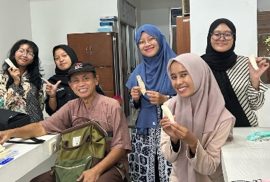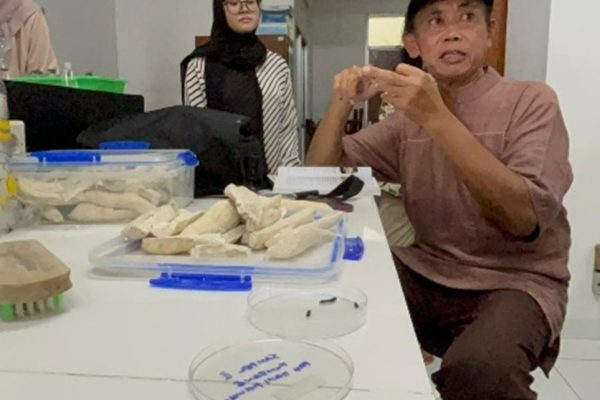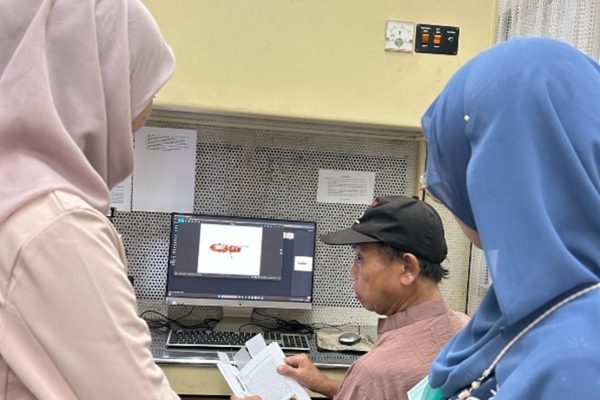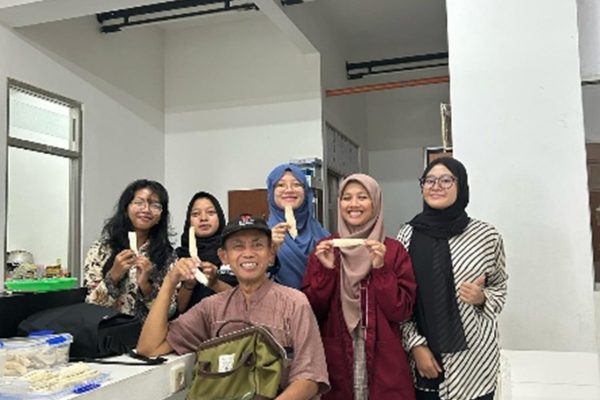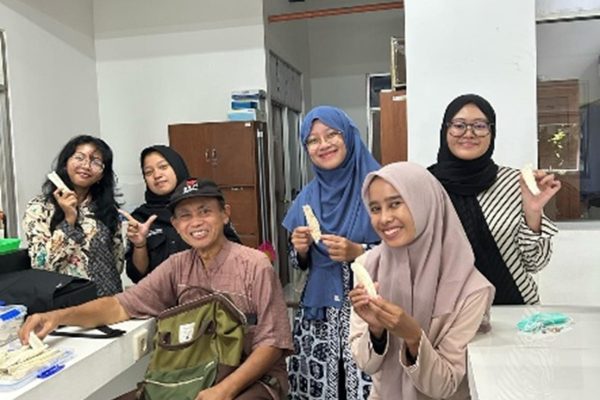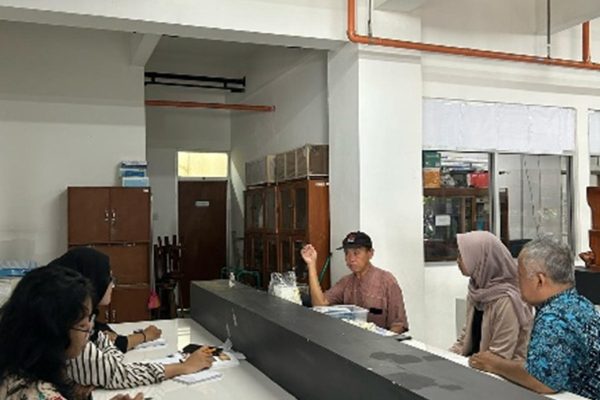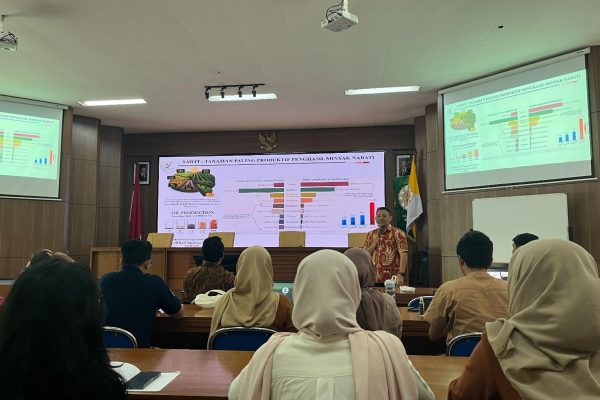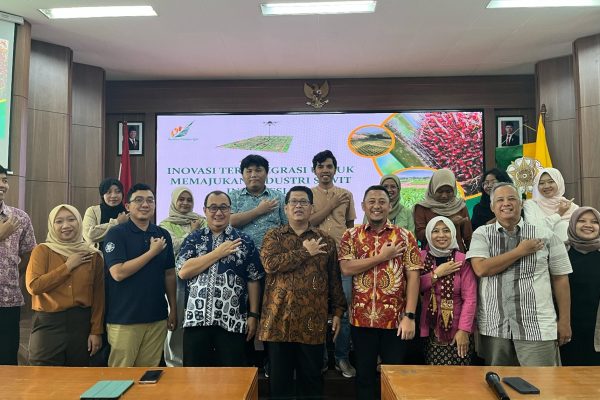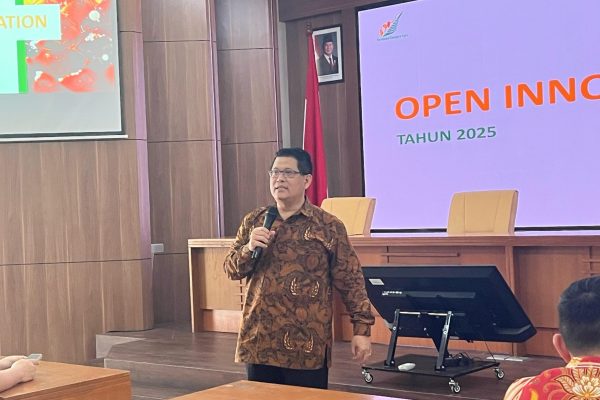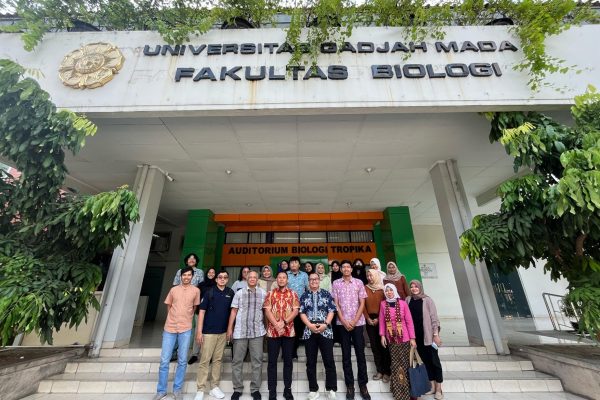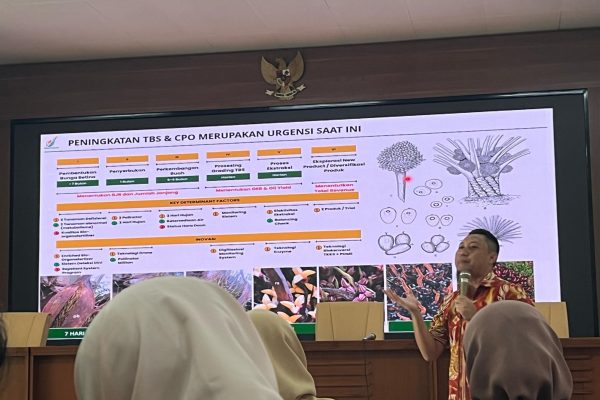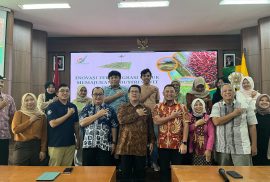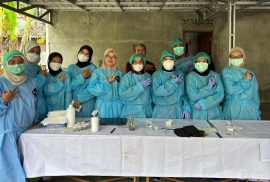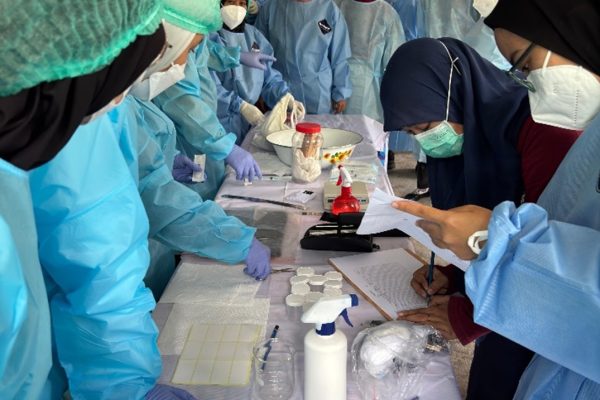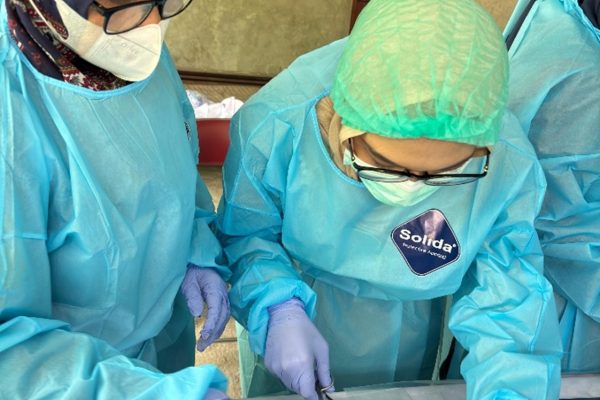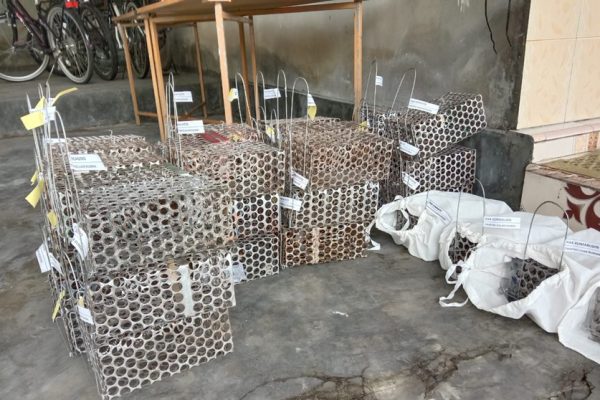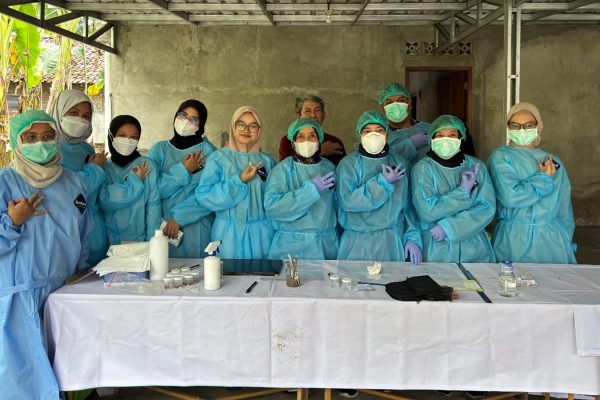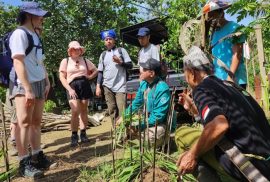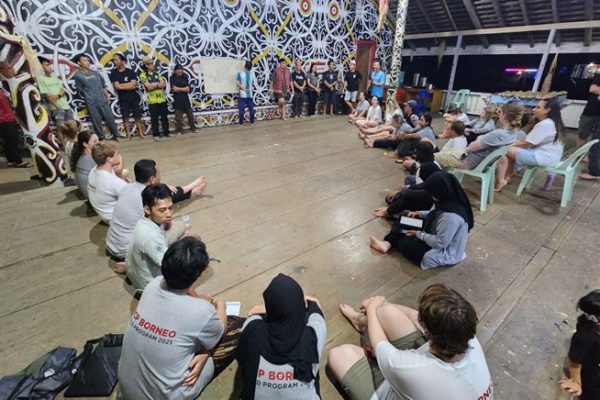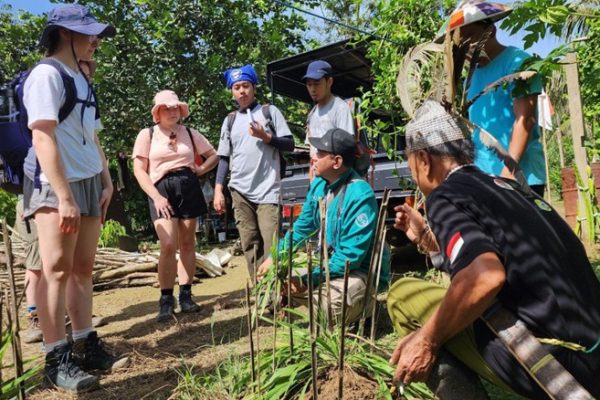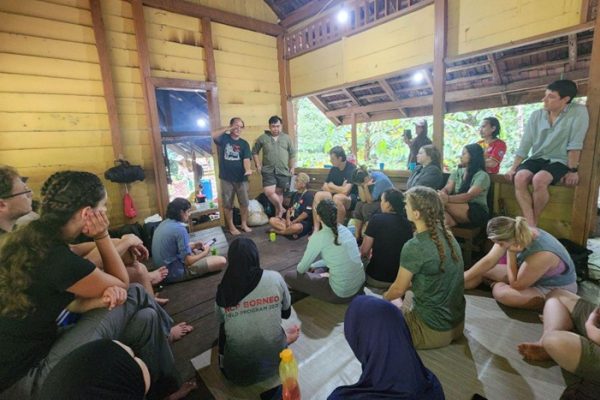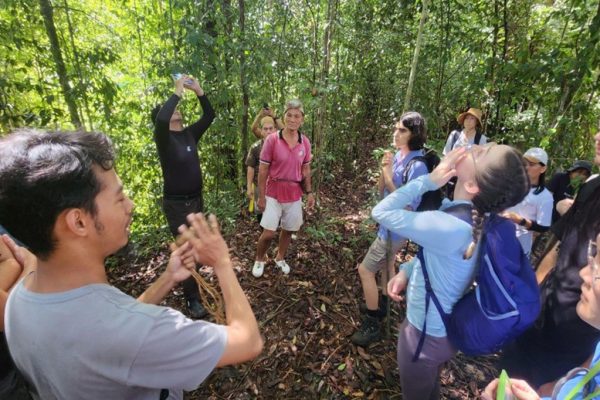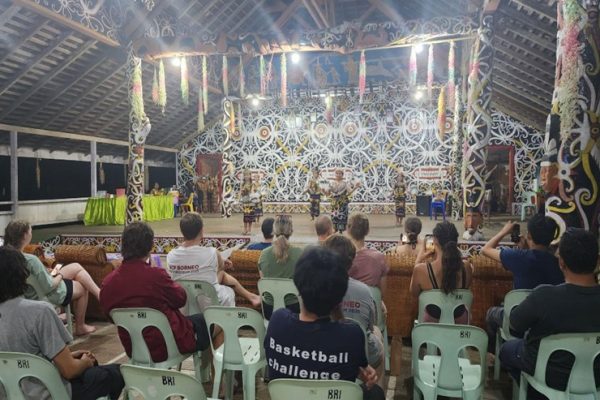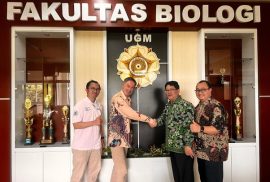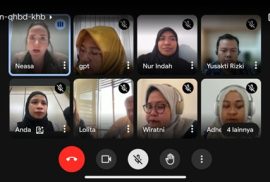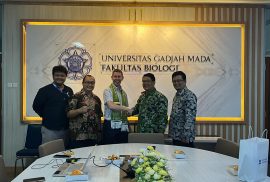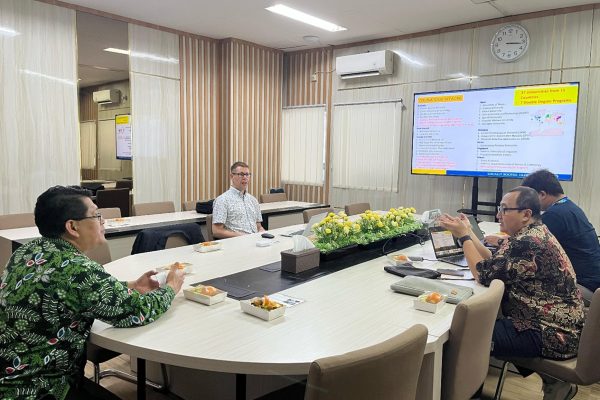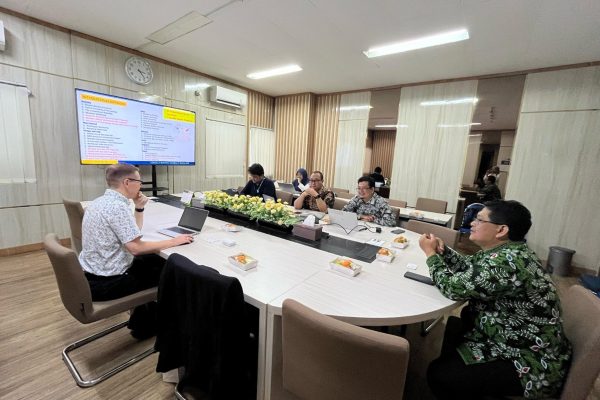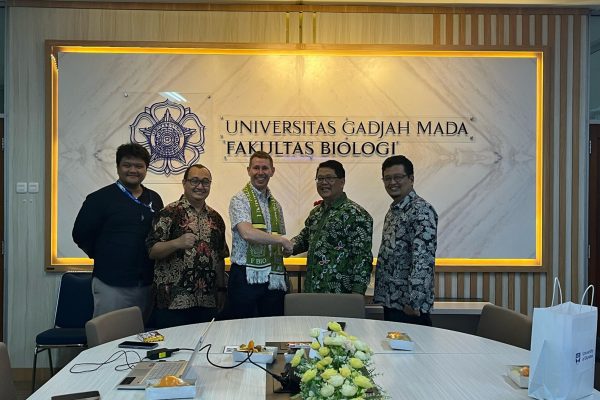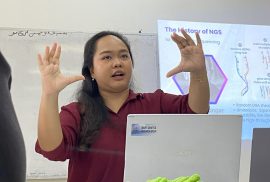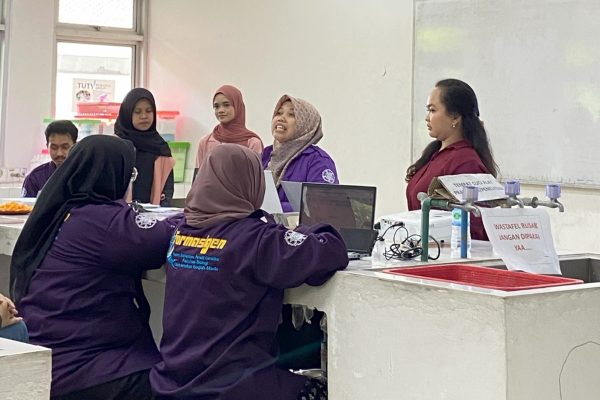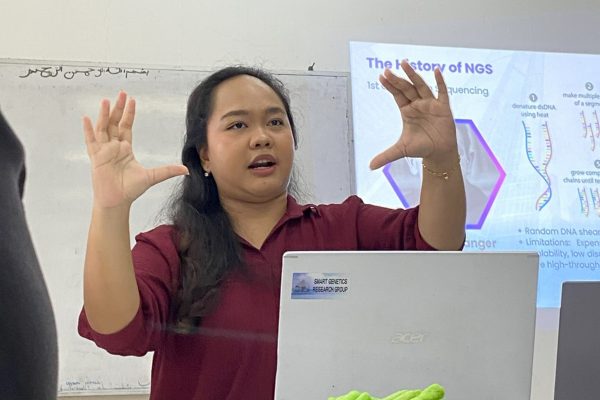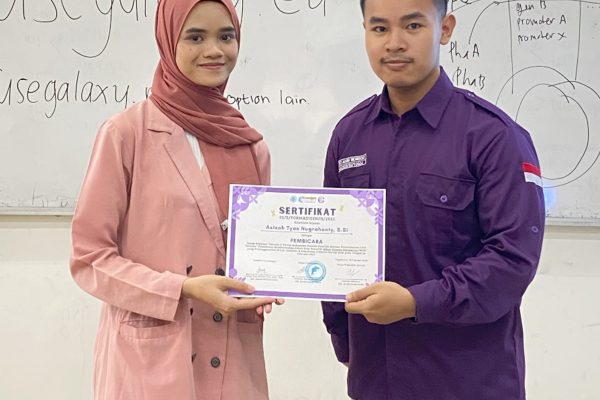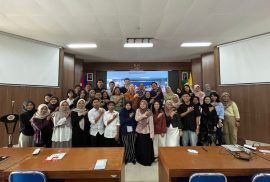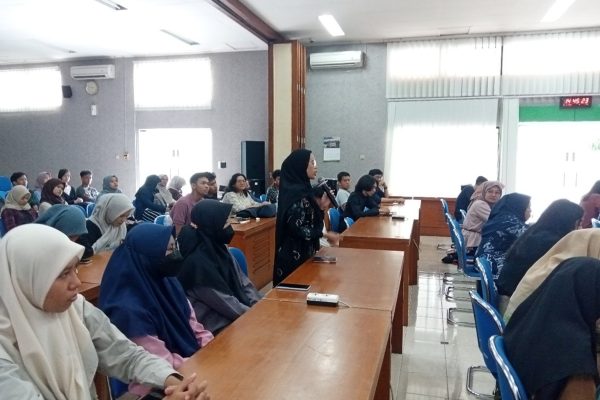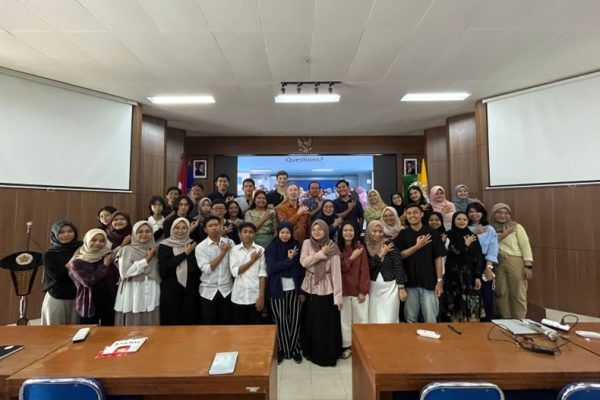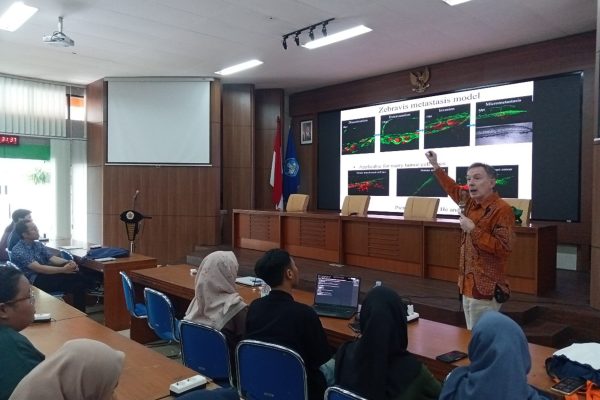Arsip:
Innovation
Yogyakarta, March 20, 2025 – The Entomology Laboratory of the Faculty of Biology, Universitas Gadjah Mada (UGM), conducted a training session on the Identification and Rearing of Wood and Bamboo Pest Insects. The training was attended by students, Entomology Laboratory lecturers (Drs. Hari Purwanto, M.P., Ph.D., Dr. Eng. Atikah Fitria Muharromah, S.Si., M.Eng., Aryo Seto Pandu W., S.Si., M.Sc.), and laboratory staff (Rio Tri Rahmawati, S.Si.) as part of the implementation of the KDM and Lit-MBKM Research Grant 2025.
This event featured Drs. Agus Ismanto, a researcher in wood and bamboo pests from the National Research and Innovation Agency (BRIN), as the main speaker. The session was officially opened by the Head of the Entomology Laboratory and continued with a presentation by Drs. Agus Ismanto. He delivered an in-depth training on rearing techniques and the identification of pest insects that commonly attack wood and bamboo, two crucial commodities in Indonesia’s handicraft industry.
According to Drs. Agus Ismanto, identifying pest insects is a crucial first step in effective pest management. During the training, participants learned various identification techniques using microscopes and other tools such as loops. They were also trained to recognize the physical characteristics of different pest species commonly found in wood and bamboo, including Dynoderus sp., Lyctus sp., and Mynthea sp.. Additionally, the session covered various solutions to combat pest infestations that could degrade the quality of wood and bamboo. These solutions included environmentally friendly methods such as soaking and boiling the wood or bamboo in water.
This training also aimed to strengthen collaboration between academics, researchers, and students in an effort to enhance understanding of the importance of protecting wood and bamboo from pest infestations, which could impact both economic and ecological sectors.
The event is expected to bring significant benefits to all participants while expanding knowledge about the role of insects as pests and the importance of entomological research in improving the quality of wood and bamboo craft commodities in Indonesia.
This training not only provided academic benefits but also contributed to achieving several Sustainable Development Goals (SDGs), including: SDG 4: Quality Education, SDG 9: Industry, Innovation, and Infrastructure, SDG 12: Responsible Consumption and Production, and SDG 15: Life on Land.
Yogyakarta, 20 February 2025 , PT Bumitama Gunajaya Agro (BGA) continues to demonstrate its commitment to advancing innovation within Indonesia’s palm oil sector through the implementation of its 2025 Open Innovation Program. The program was formally introduced during a socialization event held at the Tropical Biology Auditorium, Faculty of Biology, Universitas Gadjah Mada (UGM), and was attended by faculty members and students.
This activity also marked the continuation of collaboration between PT BGA and the Faculty of Biology UGM in the previous year. In his opening address, Dean of the Faculty of Biology, Prof. Dr. Budi Setiadi Daryono, M.Agr.Sc., underscored the strategic importance of partnerships between academia and industry in enhancing the relevance and quality of research and innovation. He expressed appreciation for the opportunity to strengthen this partnership, noting that he was a recipient of the BGA Innovation Grant in the previous cycle.
Dr. Ade Agung Laksono, Head of the Bumitama Academy Department at PT BGA, delivered the keynote presentation titled “Integrated Innovation for Advancing the Indonesian Palm Oil Industry.” In his presentation, Dr. Ade reaffirmed BGA’s dedication to facilitating broader participation by Indonesian researchers in addressing practical challenges within the national palm oil industry.
“BGA operates primarily in upstream plantation management. Through this research grant initiative, we seek to explore the potential of Indonesian researchers in delivering applied solutions to key issues in the palm oil sector,” Dr. Ade stated.
Among the critical challenges highlighted were the decline in production capacity due to pest outbreaks and inefficiencies in the processing of crude palm oil into refined products. To address these issues, BGA is offering researchers access to plantation land, thereby providing an opportunity to apply their research’s findings.
Among the critical challenges highlighted were the decline in production capacity due to pest outbreaks and inefficiencies in the processing of crude palm oil into refined products. To address these issues, BGA is offering researchers access to plantation land, thereby providing an opportunity to apply their research’s findings.
In addition to faculty researchers, the 2025 Open Innovation Program is also open to university students across Indonesia. This initiative is expected to further promote research-based innovation originating from academic institutions such as the Faculty of Biology UGM, contributing meaningfully to the development of the national palm oil industry. Furthermore, it aligns with key objectives of the Sustainable Development Goals (SDGs), particularly SDGs No. 4 on Quality Education and SDGs No.17 on Partnerships for the Goals.
Through this initiative, PT BGA aspires to strengthen the integration between higher education institutions and industry, while fostering impactful and solution-oriented research in the fields of agriculture and plantation science in Indonesia.
Yogyakarta, February 20, 2025 – PT Bumitama Gunajaya Agro (BGA) continues to strengthen its commitment to driving innovation in Indonesia’s palm oil industry through its Open Innovation program. The socialization of this program was held at the Tropical Biology Auditorium of the Faculty of Biology, Universitas Gadjah Mada (UGM), Yogyakarta, and was attended by both faculty members and students from the Faculty of Biology UGM. This event also marked the continuation of the collaboration between BGA and the Faculty of Biology UGM, which began last year.
In his opening remarks, Prof. Dr. Budi Setiadi Daryono, M.Agr.Sc., Dean of the Faculty of Biology UGM, emphasized the importance of cooperation between academic and industry to enhance the quality of research and innovation. He expressed great appreciation for the opportunity to continue this collaboration, especially since the Dean himself was one of the recipients of BGA’s innovation grant last year.
During the event, Dr. Ade Agung Laksono, Bumitama Academy Department Head at PT BGA, served as the keynote speaker. Under the theme “Integrated Innovation to Advance the Indonesian Palm Oil Industry,” Dr. Ade shared BGA’s commitment to opening opportunities for Indonesian researchers to directly contribute to the development and sustainability of the national palm oil industry. “BGA focuses on the upstream management of palm oil plantations, and through the research grant we offer, we aim to explore the potential of Indonesian researchers in providing practical solutions to the various challenges in the palm oil sector,” said Dr. Ade.
In his presentation, Dr. Ade also highlighted some of the main challenges facing the Indonesian palm oil industry this year, including reduced production capacity due to pest attacks and suboptimal processing of crude palm oil into edible oils. To address these issues, BGA is offering researchers the opportunity to apply their findings directly in the field, utilizing the land provided by BGA.
This year, the BGA research grant program not only invites faculty members but also opens up participation to students from universities across Indonesia. Through this initiative, it is hoped that the research innovations emerging from the Faculty of Biology UGM can further contribute to the advancement of the palm oil industry in Indonesia, while supporting the achievement of the Sustainable Development Goals (SDGs), particularly for inclusive education (SDG 4) and collaborative innovation (SDG 17). This initiative is expected to strengthen the synergy between education and industry, opening opportunities for more applicable research that can have a direct impact on the agricultural and palm oil plantation sectors in Indonesia.
Bantul, Indonesia – February 19, 2025 – In a proactive public health initiative, students from the Faculty of Biology, Universitas Gadjah Mada (UGM) collaborated with the Bantul District Health Office and the Yogyakarta Public Health Laboratory Center (BBLABKESMAS) to conduct rodent surveillance in Beran Hamlet, Canden Village, Jetis Subdistrict, Bantul Regency. This joint effort was initiated following confirmed human cases of leptospirosis and hantavirus in the area, with the infections suspected to have also affected other family and community members.
The surveillance began on Tuesday, February 18, with the placement of 50 single-live rat traps. As a result, nine traps captured rats (Rattus spp.) and two traps captured Asian house shrews (Suncus murinus), both considered potential reservoirs of disease.
The student research team comprised Dita Dwi Putri, Zahwa Khoirun Nisa, Dhiyaa Sekar Hanum, Shaila Revita Zahra, and Trissa Amalia Putri and Rizky Nur Endah Sari. Their participation is part of the Merdeka Belajar Kampus Merdeka (MBKM) Research Program, supervised by Dr. Dra. Rr. Upiek Ngesti Wibawaning Astuti, B.Sc., DAP&E, M.Biomed.
Moving forward, molecular analysis will be conducted on the captured specimens to detect the presence of Leptospira bacteria and hantavirus, providing crucial data to inform future public health responses. This initiative reinforces the Faculty of Biology UGM’s dedication to community welfare and aligns with Sustainable Development Goals (SDGs), including SDGs No 3: Good Health and Well-being, SDGs No 4: Quality Education, SDGs No 15: Life on Land, and SDGs No 17: Partnerships for the Goals.
The Faculty of Biology, Universitas Gadjah Mada (UGM), in collaboration with Western Sydney University (WSU), successfully conducted the International Summer Course (ISC) program in Setulang Village and the Tane Olen Community Forest, Malinau Regency, North Kalimantan. This program followed a series of academic and cultural exchanges held earlier in Yogyakarta and Tarakan.
On Sunday, January 26, 2025, ISC participants arrived in Malinau and continued their journey to Setulang Village. The UGM delegation included two faculty members ; Dr. Rury Eprilurahman and Mukhlish Jamal Musa Holle, M.Env.Sc, D.Phil. and six students. The WSU delegation, consisting of two staff members, Dr. John Hunt and Louise Graham, and 16 students.
The program commenced with a warm welcome from the Setulang community, featuring traditional dance performances and remarks from the Village Head, Mr. Saleh Wang. Field activities began the following day with observations of rice fields and home gardens owned by local residents, including an introduction to farming system and the diversity of plant species cultivated in the Mr. Philius’s home garden, a village elder.
On January 28, the program moved to the Tane Olen Community Forest, a lowland dipterocarp forest known for its rich biodiversity. Participants traveled by pickup and continued on foot along river trails to two basecamps: Lepo Kalung and Waterfall Basecamp. From January 28 to February 5, daily activities included birdwatching, jungle trekking, herpetofauna observation (herping), and thematic discussions with local guides and researchers.
Dr. Rury Eprilurahman led herpetofauna identification sessions and delivered a herpetology sharing session on January 29. On January 30, local guides introduced participants to useful plant species during a trek through riparian and hilly zones. That evening, an ethnobotany discussion was held between ISC participants and the local community.
Dr. Rury Eprilurahman led herpetofauna identification sessions and delivered a herpetology sharing session on January 29. On January 30, local guides introduced participants to useful plant species during a trek through riparian and hilly zones. That evening, an ethnobotany discussion was held between ISC participants and the local community.
A key highlight took place on February 1 with a dialogue involving village elder Mr. Philius, Village Head Mr. Saleh Wang, and forest management representatives Andrew and Ran. The discussion focused on the history of Setulang, community conservation efforts, and sustainable forest management practices in Tane Olen.
The ISC program concluded on February 5 with a closing ceremony in Setulang Village. The event was attended by the Subdistrict Head of South Malinau Hilir, village officials, and community leaders, and featured traditional dance performances by residents of all ages.
This international collaboration not only enhanced cross-cultural academic exchange but also embodied the principles of Sustainable Development Goals (SDGs) 11 (Sustainable Cities and Communities), 14 (Life Below Water), and 15 (Life on Land).
Yogyakarta, 14 February 2025 – Faculty of Biology, Universitas Gadjah Mada (UGM) and Faculty of Science, Leiden University, celebrate a decade of academic and research partnership which has had a major impact on the development of biological science. Prof. dr. Herman Spaink from the Faculty of Science Leiden University, visits Faculty of Biology to celebrates their collaboration together with the Dean of the Faculty of Biology UGM, Prof. Dr. Budi Setiadi Daryono, M.Agr.Sc. and Vice Dean for Research, Community Service, Collaboration and Alumni Affairs, Dr. Eko Agus Suyono, M.App.Sc. along with Dr. Luthfi Nur Hidayat, S.Sc., M.Sc., lecturer at of Faculty of Biology as well as alumnus of Leiden University.
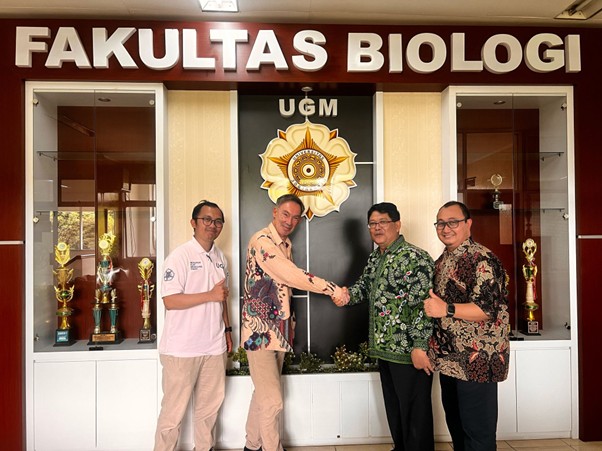
Since the collaboration began in 2015, Faculty of Biology UGM and Leiden University have carried out various joint research projects, student and lecturer exchange programs, as well as international scientific publications. Ultimately, in September 2024, Faculty of Biology UGM and the Graduate School, Faculty of Science, Leiden University signed a Joint Doctoral Degree Agreement. This program allows students from both universities to earn a doctoral degree with guidance from experts at both institutions. This agreement confirms the commitment of both institutions to strengthening academic and research relations in the field of biology.
Apart from that, the two universities also collaborated in establishing the Zebrafish Research Facility. This facility is expected to become an international research center to support the development of research in the health and natural products potential from Indonesia. This collaboration is in line with UGM’s vision of developing superior research in the fields of biotechnology and public health.
With a decade of success under their belt, both institutions are committed to continuing to expand the impact of research and innovation at the global level while strengthening their role as centers of excellence for biological research. It is hoped that this collaboration will continue to produce collaborative programs, student exchanges, joint research and quality scientific publications, providing significant benefits to the academic community and wider society.
This collaboration also contributes to achieving the Sustainable Development Goals (SDGs). In particular, SDG 4 (Quality Education) which supports access to quality education at the global level, SDG 9 (Industry, Innovation, and Infrastructure) where the development of research facilities and scientific innovation in the field of biotechnology supports the progress of research infrastructure at the international level, and SDG 17 (Partnerships for the Goals) where collaboration between UGM and Leiden University reflects the importance of global partnerships in supporting research, innovation and academic development. Thus, this collaboration not only strengthens academic and research networks, but also contributes to achieving broader sustainable development goals.
Yogyakarta, 13 February 2024 – Faculty of Biology, Universitas Gadjah Mada (UGM) participated in discussions to initiate collaboration with University College Cork (UCC), Ireland. This discussion was led by the Secretary of the Directorate of Global Partnerships and Relations at UGM, Prof. Ir. Wiratni, S.T., M.T., Ph.D., IPM, and attended by delegates from various faculties at UGM, including the Faculty of Biology, Faculty of Pharmacy, Faculty of Mathematics and Natural Sciences (MIPA), and Faculty of Agricultural Technology. The Faculty of Biology delegation was represented by Nur Indah Septriani, Ph.D., as Head of the International Affairs Office of the Faculty of Biology.
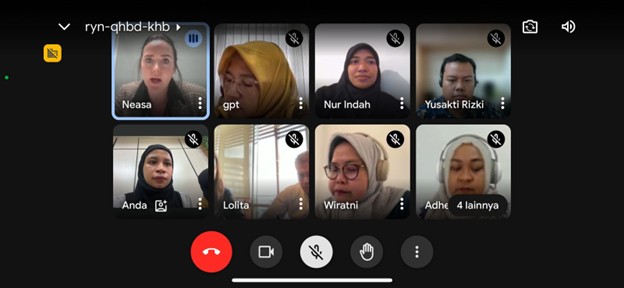
Ms. Neasa O’Connor, International Recruitment Manager College of Science, Engineering and Food Science UCC, conveyed the potential for collaboration between the UGM Faculty of Biology and the UCC School of Microbiology. On this occasion, UCC offers two master’s program schemes, regular and by research, as part of the initiation of a double degree program with the Biology Master’s program at UGM. Ms. Neasa highlighted the potential for double degree collaboration in the Master of Microbiome Science program, a new study program at UCC, as well as other master’s programs such as the Master in Bioinformatics and Master in Biotechnology and Industrial Sciences.
Nur Indah Septriani, Ph.D., expressed her appreciation and welcomed the initiation of collaboration with UCC. She mentioned that the Faculty of Biology UGM has established double degree collaborations with various world universities at undergraduate level through the International Undergraduate Program (IUP), as well as at master’s and doctoral levels. Apart from that, she also offers the potential for collaboration in annual international programs organized by the Faculty of Biology UGM, such as the International Summer Course (ISC) and the International Conference on Biological Science (ICBS).
This discussion is a strategic step in strengthening academic relations between the Faculty of Biology UGM and University College Cork, Ireland. The initiation of this collaboration is in line with the Sustainable Development Goals (SDG 4) which aims to improve access and quality of higher education through international academic collaboration. Apart from that, this collaboration also supports SDG 17, which emphasizes the importance of partnerships between educational institutions in creating a positive impact on the development of science and human resources at the global level.
Yogyakarta, 14 February 2025 – The Faculty of Biology, Universitas Gadjah Mada (UGM) received a visit from delegation from the University of Dundee, United Kingdom, in order to discuss the follow-up to academic cooperation between the two institutions. The University of Dundee delegation was represented by Dr. Christine Graham as Academic Regional Lead for South East Asia and Associate Dean for Student Recruitment and Global Partnership, School of Life Science. This visit took place in the KPTU Meeting Room, Faculty of Biology UGM and was also attended by Prof. Dr. Budi Setiadi Daryono (Dean of the Faculty of Biology UGM), Dr. Eko Agus Suyono (Vice Dean for Research, Community Service, Collaboration and Alumni Affairs), Sukirno, Ph.D. (Head of the Undergraduate Study Program), and Matin Nuhamunada, Ph.D. (Secretary of the Office of International Affairs, Faculty of Biology, UGM).
Since 2024, the Faculty of Biology together with several other faculties at UGM have established double degree collaboration with the University of Dundee, especially in the biology master’s program through the School of Life Science. This program is supported by various scholarship schemes, including the LPDP scholarship by the Ministry of Finance of the Republic of Indonesia as well as various other scholarships offered by the University of Dundee.
During this visit, Dr. Graham further introduced the University of Dundee, especially the School of Life Science, by explaining various student activities, campus facilities, and research focused in the field of Cell and Molecular Biology. This session was followed by a presentation from Dr. Eko Agus Suyono who introduced the Faculty of Biology UGM to the University of Dundee delegation.
Prof. Dr. Budi Setiadi Daryono welcomed this discussion and emphasized the commitment of the Faculty of Biology UGM in supporting international academic collaboration. He highlighted the high interest of students to continue their education abroad as well as the various scholarship opportunities available. Apart from that, Prof. Budi also mentioned that several students from the International Undergraduate Program (IUP) Faculty of Biology UGM are currently undergoing a double degree program at the University of Leeds, United Kingdom, and the Australian National University, Australia.
The discussion also included the potential for developing an Academic Validation Program, an inter-university curriculum validation program that allows students to obtain degree recognition from the University of Dundee without having to attend lectures directly. This program is expected to run continuously with the initiation of the 4+1 (Undergraduate-Master) scheme. In addition, Matin Nuhamunada, Ph.D. adding that the University of Dundee has the opportunity to participate in the Faculty of Biology UGM’s annual international agenda, such as the International Summer Course (ISC) and the International Conference on Biological Science (ICBS).
This visit is a strategic step in strengthening relations between the Faculty of Biology UGM and the University of Dundee. This follow-up discussion is in line with the Sustainable Development Goals which encourage increasing access and quality of higher education through international academic collaboration (SDG 4) and emphasizes the importance of synergy between educational institutions in creating a positive impact on the development of science and human resources at the global level (SDG 17).
On Friday, 14th of February 2025 at 1-1.30 PM, Gentalk 1 is held in the Laboratory of Genetics and Breeding, Faculty of Biology UGM. This program is targeted for all Formasigen members and Biology UGM students in general. Mrs. Ganies Riza Aristya, S.Si., M.Sc., Ph.D., as Formasigen’s supervisor lecturer, also attended this program. Gentalk is an active discussion and sharing session between alumni or senior student and Formasigen’s member about the undergraduate thesis they are working on. In the first Gentalk of this year, there are 3 speakers, which are Azizah Tyas Nugrahanty, S.Si., Lucia Arum Sekar Meysari, S.Si., and Tiara Putria Judith. Azizah Tyas Nugrahanty, S.Si and Lucia Arum Sekar Meysari, S.Si. are master students in the Faculty of Biology UGM batch 2023, while Tiara Putria Judith is a master student in the Faculty of Biology UGM batch 2024, all under the supervision of Mrs. Ganies Riza Aristya, S.Si., M.Sc., Ph.D. for their undergraduate thesis.
This program started with an opening from the Master of Ceremony, Andreas Wibisono, as a part of the Scientific Division of HomeoGenesis Cabinet, followed by an opening speech by Mrs. Ganies Riza Aristya, S.Si., M.Sc., Ph.D. as the supervisor lecturer of Formasigen. In the speech, Mrs. Ganies express her hope for this program to be held more consistently and better so that this program can be a vessel for knowledge sharing and discussion for all Faculty of Biology’s students. The next activity is a presentation from all three speakers about “ Bioinformatics approach in genomic research : Whole Genome Sequencing (WGS)” . This presentation contains the history of NGS (Next Generation Sequencing) which is a development from the previously known method, Sanger Sequencing. Unlike Sanger sequencing, NGS can detect the whole genome in a shorter time with high-throughput results. One of the applications for NGS is its usage for WGS (Whole Genome Sequencing). This presentation also introduced a website called usegalaxy as a free online platform for genome sequencing analysis. All participants are given a tutorial to access the website and follow instruction to analyse a sequence. After that, is the Q&A session followed by closing from the master of ceremony. With the success of the first Gentalk of this year, we hoped that this could be a good start to be a vessel for an interesting and beneficial discussion. We also hope that this program can give a better understanding about all the researches done by all the lecturers and their students in the Laboratory of Genetics and Breeding, Faculty of Biologi UGM. [Author: Formasigen]
Yogyakarta, February 13, 2024 – The Faculty of Biology at Universitas Gadjah Mada (UGM) successfully held a guest lecture titled “Exploring Genomics and the Role of Zebrafish as a Model Organism” on Thursday, February 13, 2024, at the Tropical Biology Auditorium, Faculty of Biology UGM. The guest lecture featured Prof. Dr. Herman Pieter Spaink, a Professor of Molecular Cell Biology from the Institute of Biology Leiden (IBL), Leiden University (LU), Netherlands. The session was moderated by Dr. Luthfi Nurhidayat, a lecturer in Animal Physiology at the Faculty of Biology UGM.
In his presentation, Prof. Herman highlighted the background of the zebrafish research collaboration between Leiden University and Faculty of Biology UGM, which has been ongoing since 2019. This collaboration was realized through the establishment of “Twin Labs UGM and LU”, a joint research facility dedicated to developing studies on bioactive components that contribute to health and nutrition.
Prof. Herman explained that zebrafish were chosen as the primary subject of this collaborative project due to their ease of cultivation and the significant genetic similarity they share with humans. Therefore, zebrafish serve as a model organism in health research to study various human diseases, including tuberculosis, diabetes, cancer, neurovascular diseases, immune disorders, and Alzheimer’s disease.
Additionally, Prof. Herman elaborated on several ongoing and completed projects with UGM, such as the use of robotic injection systems on zebrafish embryos and sequencing of various local fish species in Indonesia. He emphasized that this collaboration is of high strategic value as it optimizes the utilization of Indonesia’s bioactive components by combining Leiden University’s expertise in zebrafish screening, which has resulted in over 200 scientific publications.
At the end of the session, Prof. Herman expressed his hope that the collaboration between UGM and Leiden University will continue and bring significant benefits to both universities and countries. With increasingly close synergy, it is expected that the research produced will make a substantial contribution to the development of global science and health.

